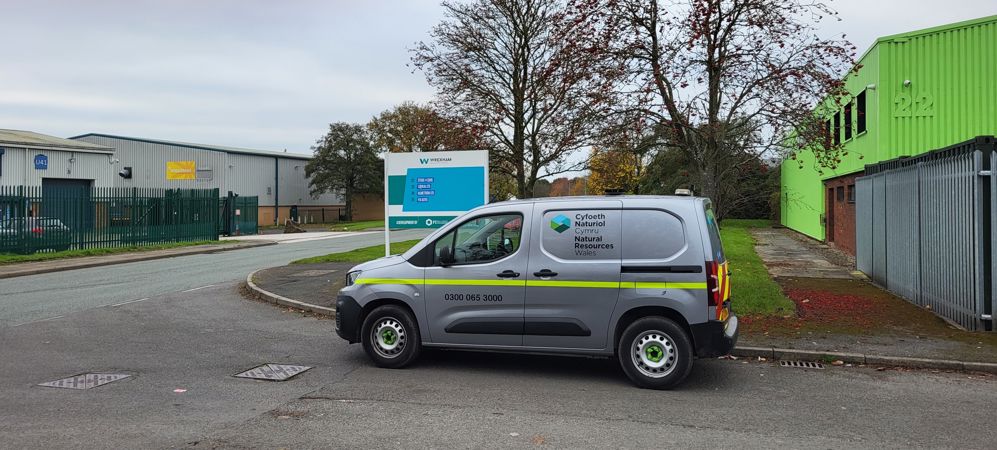How businesses can prevent pollution on industrial sites

We all know how important clean rivers are for the environment, wildlife and people. Yet, across North East Wales, rivers are at risk from pollution caused by accidental releases from local industrial estates.
In an effort to protect local watercourses, NRW officers will soon visit businesses on Wrexham Industrial Estate to offer advice and ensure that pollution prevention measures are in place.
This will be the latest visit to North East Wales industrial estates, following previous visits to Whitegate and Ty’n y Llidiart Industrial Estates.
The goal is simple: help businesses identify risks and take steps to prevent harmful substances from entering nearby rivers and streams. The consequences of pollution can be severe, affecting wildlife, plant species, and water quality – especially in areas as sensitive as the River Dee, a vital waterway for both wildlife and people.
Why this matters
The River Dee is more than just a beautiful waterway. It’s designated as a Site of Special Scientific Interest (SSSI) and a Special Area of Conservation (SAC). These designations highlight its importance for various protected species, such as salmon, otters, and rare plants. The river is also a major source of drinking water for the region.
However, the nearby industrial estates have been a source of pollution incidents over the years. Polluting substances, such as oils and chemicals, have accidentally entered the river system, often through surface water drainage systems that were never intended to carry these harmful materials.
This is why pollution prevention measures are so crucial for industrial estates located near rivers, like Wrexham Industrial Estate. Several watercourses run through the estate before joining the River Clywedog, a tributary of the River Dee, which is highly sensitive to contamination.
What businesses can do
Businesses play a critical role in preventing pollution. Officers visiting Wrexham Industrial Estate will help local companies assess their pollution risks and provide advice on necessary mitigation measures. This will also include discussions about whether businesses need special consent under the Dee Water Protection Zone regulations, which require approval for the use or storage of certain substances on specific sites.
To help you ensure that your business is operating in an environmentally safe manner, here’s a quick 10-point checklist to guide you through pollution prevention:
Site Drainage:
1/ Do you know where your drains go?
- Make sure only clean water, such as roof drainage, goes into surface water drains. Contaminated water, like sewage or trade effluent, should always go into foul drains.
2/ Do you have an up-to-date drainage plan?
- Understanding your drainage system is crucial in preventing accidental pollution.
Storing Oils, Chemicals, and Polluting Materials:
3/ Are your storage containers fit for purpose?
- Regularly inspect and maintain containers to prevent leaks and spills.
4/ Are storage areas away from watercourses and surface drains?
- Keep hazardous materials far from water sources to reduce contamination risk.
5/ Do you use secondary containment?
- Secondary containment, such as bunds, can catch leaks or spills and prevent them from entering the drainage system.
6/ Do you have safe procedures for delivery and handling?
- Properly handling materials can prevent accidents and spills.
Waste Management:
7/ Are you managing your waste safely and legally?
- Proper waste management is key to reducing pollution.
8/ Do you know where your waste goes?
- Always be able to prove that your waste is disposed of legally.
9/ Are you reducing and recycling your waste?
- Minimising waste generation reduces your business's environmental impact.
Emergency Response:
10/ Do you have an emergency plan in place?
- Make sure you have the right equipment and training to handle pollution or fire emergencies, and test your plan regularly.
If you answered "no" to any of these questions, now is the time to take action. You can get advice by calling us 0300 065 3000 to ensure you’re operating safely and responsibly.
Stay vigilant and protect our waterways
Remember, it’s not just about compliance with regulations – it’s about protecting the environment and ensuring a sustainable future for the community. Whether you're storing chemicals or managing waste, every step you take to prevent pollution makes a difference. Regularly reviewing your site and procedures with this checklist can help you catch potential issues before they become major problems.
Our officers are here to support businesses in preventing pollution and protecting the rivers that are vital to North East Wales.
Further information can be found at the following links:
